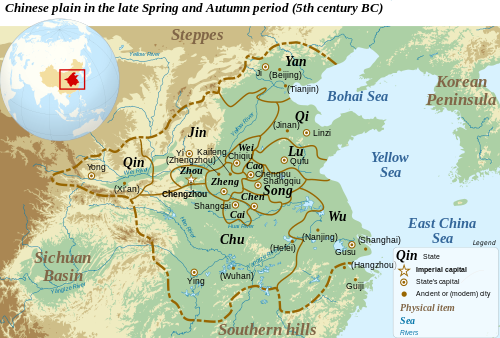|
Zheng (state)
Zheng (/dʒɛŋ/; Chinese: 鄭; Old Chinese: *[d]reng-s) was a vassal state in China during the Zhou dynasty (1046–221 BCE) located in the centre of ancient China in modern-day Henan Province on the North China Plain about 75 miles (121 km) east of the royal capital at Luoyang. It was the most powerful of the vassal states at the beginning of the Eastern Zhou (771–701 BCE), and was the first state to clearly establish a code of law in its late period of 543 BCE. Its ruling house had the ancestral name Ji (姬), making them a branch of the Zhou royal house, who held the rank of Bo (伯), a kinship term meaning "elder". FoundationZheng was founded in 806 BC when King Xuan of Zhou, the penultimate king of the Western Zhou, made his younger brother Prince You (王子友) Duke of Zheng and granted him lands within the royal domain in the eponymous Zheng in modern-day Hua County, Shaanxi on the Wei River east of Xi'an. Prince You, known posthumously as Duke Huan of Zheng, established what would be the last bastion of Western Zhou. He went on to serve as Situ under King You of Zhou. When the Quanrong tribes sacked the Zhou capital Haojing in 771 BC, Duke Huan was killed along with his nephew King You of Zhou. Duke Huan was succeeded by his son Duke Wu (鄭武公). Along with Marquis Wen of Jin, Duke Wu supported King Ping of Zhou against a rival, thereby helping to establish the Eastern Zhou. He re-established the state of Zheng in modern-day Xinzheng (meaning New Zheng), Henan, and annexed the state of Eastern Guo and defeated Kuai. The Zheng rulers served as high ministers of the Zhou kings for several generations.[1][2][3][4] Spring and Autumn periodEarly dominanceThe state of Zheng was one of the strongest at the beginning of the Spring and Autumn period. Zheng was the first Zhou state to annex another state, Xi, sometime between 684 and 680 BC. Throughout the Spring and Autumn period, Zheng was one of the wealthiest states, relying on its central location for inter-state commerce and having the largest number of merchants of any state. Zheng often used its wealth to bribe itself out of difficult situations. Duke Zhuang of Zheng (743–701 BC) was arguably a forerunner of the Five Hegemons, though Zheng derived its dominance by dramatically different means compared to those of the later hegemons by defeating an alliance of feudal states led by Zhou itself and wounding King Huan of Zhou. When Duke Zhuang died there was a civil war between his sons and Zheng ceased to be a powerful state.[5] Zheng Wen Gong wen Tai BoThis bamboo manuscript records a conversation about Zheng history between Duke Wen of Zheng (r. 672–628 BCE) and the elderly Tai Bo. Zheng state's beginning under Duke Huan (r. 806–771) is recalled by Tai Bo. Duke Huan's son Duke Wu (r. 770–744) moved Zheng state east. Its neighboring states acknowledged Zheng as a paramount power. Duke Zhuang (r. 743–701) furthered Zheng state's position of dominance. When Duke Zhuang died his elder son Duke Zhao (r. 701, 697–695) took his place. Yet the powerful Zhai Zhong favored his younger son Duke Li (r. 701–697, 680–673) and deposed Zhao to install him. Li, however, later failed to wrest control from Zhai Zhong and was pushed into exiled. After a few years Duke Zhengzi Ying (r. 694–680), Li's younger brother, became the nominal ruler of Zheng, until he was assassinated. Duke Li then returned to rule. Zheng Wen Gong was the son of Duke Li. At his father's death, Wen's succession was fraught with difficulties. He tells of the help given him by Tai Bo. It allowed Wen to reside in the traditional shed of mourning for his father, and so begin his 45-year rule [672-628]. Yet Tai Bo criticized Duke Wen for his seeking the ease of domestic pleasure. The Duke's principle consort Lady Mi came from Chu state. At times during the rule of Duke Wen, the affairs of Zheng fell under the influence of this powerful state to the south, Chu.[6][7] Later period As competition between states intensified, Zheng had no room to expand. Due to its central location, Zheng was hemmed in on all sides by larger states. During the later stages of the Spring and Autumn period, its territory became of pivotal interest in the rivalry of more powerful states. Zheng was often compelled to switch its diplomatic alliances. It had become a focus of contention between Chu and Qi, then later Chu and Jin. By the 7th century BCE Zheng found itself forced into a minor role. Notwithstanding, Zheng remained quite strong into the middle and later years of the Spring and Autumn. Under Duke Mu (r. 628–606) Zheng managed to defeat a combined alliance of Jin, Song, Chen and Wei in 607 BCE. Zheng's prime minister Zichan (543–522) became widely known as a leading statesman among the rival states of the era. Zichan was a grandson of Duke Mu. Zheng was also widely recognized as the first state of China to publish its laws, in bronze in 536 BCE. Zheng later declined, due to disorders from conflicts among as its feuding clans. In 375 BCE during the following Warring States period Zheng was annexed by Han state.[1][2][3][4] XingyangThe Zheng family of Xingyang 荥阳郑氏 claim descent from the Zhou dynasty kings through the rulers of the State of Zheng. The Marquis of Xingyang rank was created for Zheng Xi.[8] The Xingyang Zheng descendants included Zheng Daozhao and Zheng Xi.[9] Zheng Wanjun was a member of the Xingyang Zheng.[10] Other Xingyang Zheng descendants were Zheng Yuzhong (Zheng Qiao)[11] and Zheng Jiong.[12] List of rulers
Rulers family tree
Other people from Zheng
References
Further reading
|
|||||||||||||||||||||||||||||||||||||||||||||||||||||||||||||||||||||||||||||||||||||||||||||||||||||||||||||||||||||||||||||||||||||||||||||||||||||||||||||||||||||||||||||||||||||||||||||||||||||||||||||||||||||||||||||||||||||||||||||||||||||||||||||||||||||||||||||||||||||||||||||||||||||||||||||||||||||||||||||||||||||||||||||||||||||||||||||||||||||||||||||||||||||||||||||||||||||||||||||||||||||||||||||||||||||||||||||||||||||||||||||||||||||||||||||||||||||||||||||||||||||||||||||||||||||||||||||||||||||||||||||||||||||||||||||||||||||||||||||||||||||||||||||||||||||||||||||||||||||||||||||||||||||||||||||||||||||||||||||||||||||||||||||||||||||||||||||||||||||||||||||||||||||||||||||||||||||||||||||||||||||||||||||||||||||||||||||||||||||||||||||||||||||||||||||||||||||||||||||||||||||||||||||||||||||||||||||||||||||||||||||||||||||||||||||||||||||||||||||||||||||||||||||||||||||||||||||||||||||||||||||||||||||||||||||||||||||||||||||||||||||||||||||||||||||||||||||||||||||||

